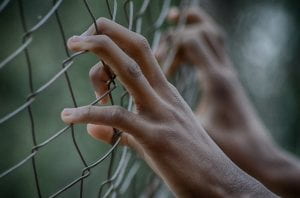by Pamela Zuber

While people in many places in the United States and around the world are experiencing human rights violations, the news is not entirely bleak. There are also positive developments. One is in juvenile justice.
How has juvenile justice progressed?
On October 1, 2019, four U.S. states allowed people seventeen years old and under to be tried automatically as adults: Georgia, Michigan, Texas, and Wisconsin.
Members of Michigan’s state House of Representatives and state Senate took steps to change that statistic. They passed legislation in October 2019 that would:
- Define adults as people eighteen years old and older.
- Place seventeen-year-olds in family court, not adult criminal court.
- Assign alternatives such as counseling and monitoring instead of incarceration or help accused youth avoid traditional court procedures entirely.
- Give prosecutors the option to try people under the age of seventeen as adults if they are accused of violent crimes such as murder or rape if they have court approval.
- Prevent seventeen-year-olds from being incarcerated in the same facilities as adults.
- Not apply to seventeen-year-olds who have been previously sentenced as adults.
Legislators previously had trouble reaching agreement on the Michigan bill because of a dispute over funding for juveniles in the state’s justice system. The state of Michigan and the state’s counties currently share such funding responsibilities, but under the 2019 bill, the state would fund the first few years of the new program. The funding arrangement could help ease financial burdens for counties struggling to fund programs relating to health and wellness, law enforcement, and other services.
Known as a raise the age bill, Michigan governor Gretchen Whitmer signed this bill, Senate Bill 84, into law on October 31, 2019. The provisions in the bill will take effect in 2021.
What are the advantages of charging people as juveniles?

Charging people who are seventeen years old or younger as juveniles instead of adults may produce many benefits. On a short-term basis, it may be safer if accused young people are housed with other young people instead of adults. Young people treated as adults may be incarcerated with people accused of or convicted of violent crimes. The safety of juveniles could be at stake.
Designating people as juveniles also may produce more long-term benefits. For one, it could save money. A 2011 report published by the Vera Institute of Justice stated that raising the age of adult prosecution from sixteen to eighteen could provide millions of dollars in benefits for youth, victims, and taxpayers in the state of North Carolina. Such changes could initially cost money because they would require changes to the youth justice system, but in the long run, they could save money by not engaging the adult justice system.
Proponents of prosecuting children as adults have said that this prosecution could scare youths straight. They claim it could prevent young people from committing serious crimes because they are frightened of the consequences. But studies have shown that such harsh penalties do not deter young people from committing serious crimes.
Judicial system changes may help reconcile what we’re learning about the biology of young people. “Researchers focused on brain development have found that 18- to 24-year-olds—also referred to as young adults — stand out as a distinct developmental group with heightened impulsive behavior, risk taking, and poor decision making,” wrote scholars at the Council of State Governments (CSG) Justice Center in 2015.
Teens’ impulsiveness, judgment problems, and desire to experiment may thus make them liable to try alcohol and drugs and engage in other dangerous practices. They could be using such substances to rebel against their parents and other caretakers. After they use drugs or alcohol, the substances may alter their still-developing brains, creating life-altering consequences. Similarly, teens who engage in illegal behavior may face legal consequences. If they’re tried as adults, they may spend years behind bars or face other repercussions that could haunt them for their entire lives.
Who else advocates for juvenile justice reform?
Michigan legislators aren’t the only people and organizations advocating for changes to the justice system for juveniles. Organizations such as the Campaign for Youth Justice (CFYJ) are working to stop the prosecution of children under the age of eighteen as adults and end youths’ incarceration in adult facilities. The CFYJ says that this advocacy is necessary. It claims that 95,000 U.S. children are housed in adult prisons and jails every year and that several states and the District of Columbia allow children as young as seven years old to be prosecuted as adults.
Efforts from the Juvenile Law Center (JLC) are also trying to change the juvenile justice system. Like the Campaign for Youth Justice, it wants to end the prosecution of children as adults. The JLC is also working to end harsh conditions and solitary confinement at juvenile correctional facilities. It seeks to stop sentencing youth to serve their entire lives in prison without parole and end economic practices such as fines and fees that keep poor children confined more than more affluent ones. In addition, it also wants prisons and jails to provide educational opportunities for youth that can help them build better lives that prevent them from committing additional crimes and re-entering the correctional system.
On the websites for both organizations, there are sections that allow people to donate to their causes. Both sites also offer updates to keep people informed. The Campaign for Youth Justice (CFYJ) site also allows people to share their stories and give testimonials. It provides instructions on how people can contribute to the organization’s initiatives.
Prosecuting teenagers as youths allows people to face the consequences of their actions, but it doesn’t condemn them to serving lifetimes in prison for minor crimes that they committed when they were still growing physically and mentally. We all make mistakes, especially when we’re young. Sensible justice sentencing for juveniles acknowledges mistakes and gives people the time and opportunity to learn from them.
About the author: Pamela Zuber is a writer and editor interested in many topics, such as human rights, addiction and recovery, history, business, and science.

